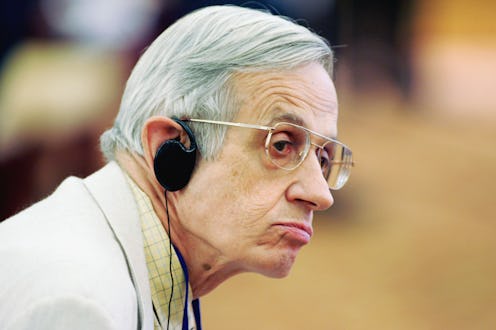News
What Did John Nash Do After 'A Beautiful Mind'?
John Nash, a Nobel-Prize winning mathematician who was the subject of the film A Beautiful Mind, died in a car crash Sunday with his wife, Alicia Nash. The film chronicled Nash's battle with schizophrenia during his time teaching at Princeton University. Nash developed a world renowned game theory that won him the 1994 Nobel Prize for Economics. And he hadn't slowed down or given up: Nash was busy after A Beautiful Mind was released in 2001.
Specifically, Nash's most famous theory, published in 1950, provided a simple but useful tool for analyzing competitive situations, which could include corporate rivalries or legislative decision making, according to The New York Times. The "Nash equilibrium" theory is used widely throughout economics, the social sciences, and even evolutionary biology, to name a few. Economist Roger Myerson of the University of Chicago compared the impact of the Nash equilibrium on economics "to that of the discovery of the DNA double helix in the biological sciences," according to the Times.
During the height of his mental illness, Nash declined a prestigious appointment at the University of Chicago because he thought he was in line to become the next emperor of Antarctica, according to The Washington Post. He also searched numerals for hidden messages, traveled abroad and attempted to give up his U.S. citizenship, or considered himself to have different identities such as a Japanese shogun, the Biblical figure Job, or a Palestinian refugee. He also apparently tried to give a student an intergalactic driver's license, according to the Post.
Some of these struggles and more were chronicled in A Beautiful Mind, where Nash was portrayed by Russell Crowe. After the release of the Oscar-winning film, Nash remarried his wife, Alicia, whom he had divorced in 1963. Alicia continued to care for Nash throughout his struggle with schizophrenia, and the two later became mental health advocates, according to the BBC.
In his biographical sketch, Nash wrote that his return to rational scientific thought was “not entirely a matter of joy as if someone returned from physical disability to good physical health," according to the Post:
Without his ‘madness,’ Zarathustra would necessarily have been only another of the millions or billions of human individuals who have lived and then been forgotten.
Nash was a senior research mathematician at Princeton since 1995. He conducted research and taught classes in logic, game theory, cosmology, and gravitation, according to his website. In a Quora article, past students wrote about what Nash was like as a professor. One student said his tests were so difficult that students often couldn't do them. A student named Joseph Kohn said Nash gave them a test once with four questions, and the first question was "What is your name?" despite the fact that there was a space for a name on the front of the test booklet. But if you didn't answer the question, then you got 25 points off your test grade. The remaining three questions were "fairly hard" mathematical questions.
In 2007, Nash published a book called The Essential John Nash, which revealed Nash's work "in his own words." The book includes all of Nash's contributions to game theory, but also his numerous works in "pure mathematics — from Riemannian geometry and partial differential equations — in which he commands even greater acclaim among academics," according to the book's description. The book includes nine of Nash's most influential papers, most of which were written between 1949-1959.
Nash and his wife were actually returning from a trip to Norway before the car crash, where Nash and Louis Nirenburg, a mathematician from New York University, had received the Abel Prize from the Norwegian Academy of Sciences and Letters, according to the Times. He received the prize for his work in partial differential equations, which are used to describe basic laws of scientific phenomena, according to Princeton's news release about his death. Princeton President Christopher L. Eisgruber released a statement about the loss on Sunday:
We are stunned and saddened by news of the untimely passing of John Nash and his wife and great champion, Alicia. ... John's remarkable achievements inspired generations of mathematicians, economists and scientists who were influenced by his brilliant, groundbreaking work in game theory, and the story of his life with Alicia moved millions of readers and moviegoers who marveled at their courage in the face of daunting challenges.
Images: Getty Images (2)
